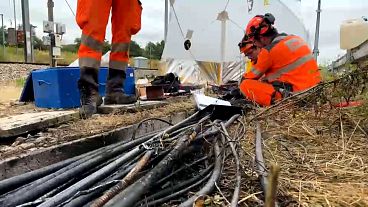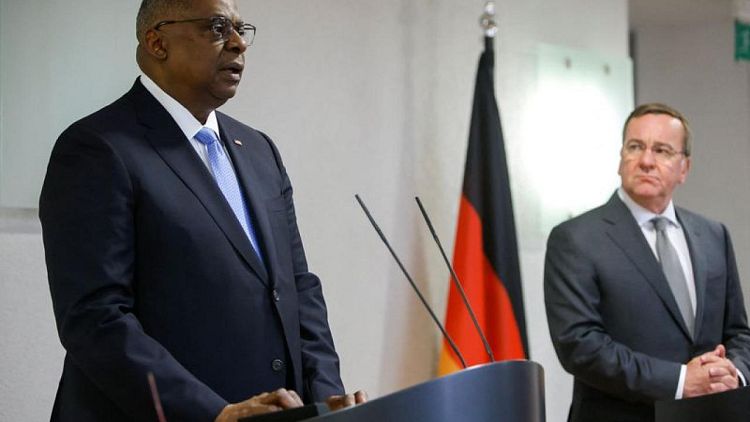By Max Hunder and Madeline Chambers
KYIV/BERLIN -The United States and Germany tried on Thursday to resolve a stand-off that has so far prevented the West from sending heavy tanks to Ukraine, as Kyiv pleaded for the weapons help it to turn the tide against Russian forces.
U.S. Defense Secretary Lloyd Austin and Germany's new Defence Minister Boris Pistorius talked in Berlin just hours after Pistorius was sworn into office.
But there was no word on whether they had resolved differences that could see Berlin block Western plans to send Kyiv heavy tanks when dozens of allies gather on Friday at Ramstein, Washington's main European air base.
Billions of dollars worth of military aid is expected to be pledged at the Ramstein meeting, billed as a chance for the West to give Ukraine what it needs to defeat Russia in 2023.
Countries including Canada, the Netherlands and Sweden have already announced armoured vehicles and air defences.
But the big question will be whether the meeting brings heavy tanks, which Kyiv says it needs to fend off Russian assaults and recapture occupied land.
"We have no time, the world does not have this time," Andriy Yermak, head of the Ukrainian presidential administration, wrote on the Telegram messaging app on Thursday.
"The question of tanks for Ukraine must be closed as soon as possible," he said. "We are paying for the slowness with the lives of our Ukrainian people. It shouldn't be like that."
Berlin has so far blocked allies from sending its Leopard 2 tanks, workhorse of militaries across Europe. Washington and many Western allies say the Leopards - which Germany made in the thousands during the Cold War and exported to its allies - are the only suitable option available in big enough numbers.
A German government source said Berlin would lift its objections if Washington sends its own Abrams tanks. But U.S. officials say they have no plans yet to send the Abrams, which runs on powerful turbine engines seen as using too much fuel for Kyiv's strained logistics system to supply at the front.
NOT NORMAL TIMES
Pistorius and Austin both spoke about the importance of supporting Ukraine ahead of their meeting, but neither addressed the tank issue directly.
At a ceremony after being sworn in, Pistorius said: "These are not normal times, we have a war raging in Europe. Russia is waging a brutal war of annihilation on a sovereign country, on Ukraine."
Austin described Germany as one of Washington's closest allies and thanked it for its suppport for Ukraine so far.
Poland and Finland have already said they would send Leopards if Germany lifts its veto. In a sign of mounting frustration, Poland suggested it might do so even if Germany tries to block it.
"Consent is of secondary importance here. We will either obtain this consent quickly, or we will do what is needed ourselves," Prime Minister Mateusz Morawiecki told private broadcaster Polsat News late on Wednesday.
Russia has responded to the prospect of more weapons for Kyiv with threats of escalation. Dmitry Medvedev, a Vladimir Putin ally who stood in as president from 2008-2012 when Putin took a hiatus to act as prime minister, made one of Moscow's clearest threats to use nuclear weapons if it loses in Ukraine.
"The defeat of a nuclear power in a conventional war may trigger a nuclear war," Medvedev said. "Nuclear powers have never lost major conflicts on which their fate depends."
German Chancellor Olaf Scholz, a Social Democrat, has been reluctant to send weapons seen as provoking Moscow. Many of Berlin's Western allies say that concern is misplaced, with Russia already fully committed to war.
There have been signs of friction within Germany's governing coalition. Scholz's deputy Robert Habeck, from his coalition partners The Greens, said just last week that Germany would not stand in the way of other countries sending Leopards to Ukraine.
Marie-Agnes Strack-Zimmermann, from the coalition's third party the centrist Free Democrats, said Scholz must be careful to avoid dividing Europe.
"This can be done with a clear message to Vladimir Putin. Anyone who wants to destroy our system will have to deal with all of us democrats," she said.
Tying the Leopards to U.S. Abrams tanks could shift the onus onto Washington. Colin Kahl, the Pentagon's top policy adviser, said on Wednesday Abrams tanks were not likely to be included in Washington's next massive $2 billion military aid package, to be headlined by Stryker and Bradley armoured vehicles.
"The Abrams tank is a very complicated piece of equipment. It's expensive. It's hard to train on. It has a jet engine."
Ukraine and Russia have both relied primarily on Soviet-era T-72 tanks, which have been destroyed in their hundreds in 11 months of fighting. Kyiv says better armed and protected Western tanks would give its troops the mobile firepower to drive out Russian troops in decisive battles.
After big Ukrainian gains in the second half of 2022, the frontlines have largely been frozen in place over the past two months, with neither side making big gains despite heavy casualties in intense trench warfare.
Yevgeny Prigozhin, leader of the private Russian mercenary force Wagner which has taken a leading role in fighting near the eastern city of Bakhmut, claimed on Thursday his forces had seized the village of Klishchiivka on Bakhmut's outskirts. Kyiv has previously denied that the settlement has fallen. Reuters could not confirm the situation there.












